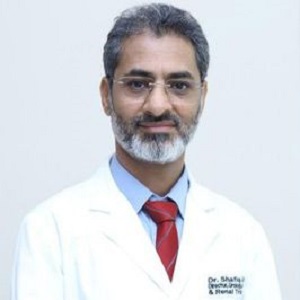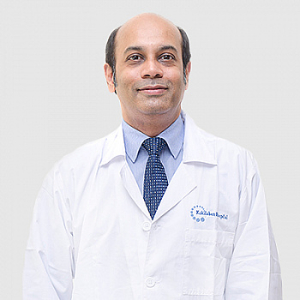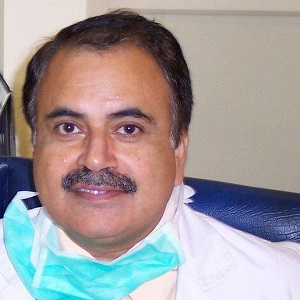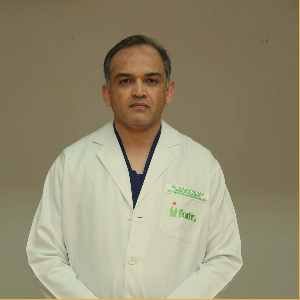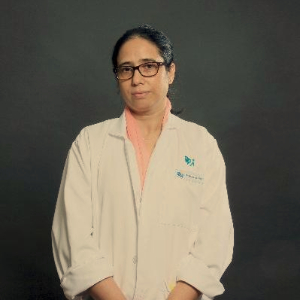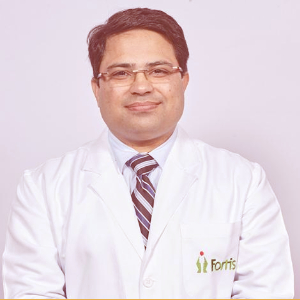Best Doctors in India for Alcoholic Hepatitis Treatment
- Urologist, Kidney Transplant
- Over 25 years’ experience
- Medanta-The Medicity, Gurgaon
Profile Highlights:
- Dr. Sanjay Gogoi brings over 25 years of extensive experience in Comprehensive Urology Practice, specializing notably in renal transplantation.
- He is distinguished for his expertise in advanced transplant techniques including Laparoscopic and Robotic-Assisted procedures.
- Dr. Gogoi received specialized training in Robotic surgery at the da Vinci Training Center, Intuitive Surgical, California.
- With a track record spanning over six years in performing Robotic Cancer surgeries on various organs such as the Kidney, Bladder, Prostate, and Adrenal, he is renowned for his proficiency in Robotic reconstructive procedures for kidneys, ureters, and bladder, catering to both adult and pediatric patients.
- Director – Urology, Andrology & Renal Transplants | BLK Hospital, New Delhi, India
- 18+ Years Experience
- BLK Super Specialty Hospital, New Delhi
Profile Highlights:
- Dr. Shafiq Ahmed is a distinguished Urologist, Uro-Oncologist, and Robotic Kidney Transplant Surgeon, currently serving as the Director of Urology, Andrology & Renal Transplant at BLK-Max Super Speciality Hospital in New Delhi.
- With over 18 years of experience in the field, Dr. Ahmed has established himself as a leading authority in urology and renal sciences, having performed more than 15,000 urological procedures.
- Dr. Ahmed’s academic contributions are equally impressive such as MBBS, MS (General Surgery), DNB (Urology), MNAMS.
- Pediatric Orthopedic Surgeon, Mumbai, India
- Over 15 years’ experience
- Lilavati Hospital & Research Centre
Profile Highlights:
- Dr. Alaric Aroojis is a renowned Pediatric Orthopedic Surgeon in Mumbai and his expertise and primary area of specialization lie in deformity correction, cerebral palsy, and congenital anomalies. He is also an expert in performing complex pelvic osteotomy for congenital hip dislocation in young patients.
- He holds an extensive experience of more than 15 years in Pediatric Orthopedics and is highly skilled at using minimally invasive procedures for difficult limb deformity corrections.
- Top Dentist and Dental Surgeon | Apollo Hospital, New Delhi, India
- 45+ Years Experience
- Indraprastha Apollo Hospital, New Delhi
Profile Highlights:
- Dr. Neeraj Verma is a highly experienced Dentist with 45 years in the field, currently practicing at Indraprastha Apollo Hospitals in New Delhi.
- Dr. Verma offers a wide range of dental services, from treating common issues like tooth decay and sensitivity to more specialized treatments for swollen gums, jaw aches, and restorative aesthetics.
- His expertise in general dentistry and porcelain veneers ensures high-quality care for all his patients.
- He holds advanced qualifications, including an MDS in Periodontics, and certifications in Orthodontics and Dental Implants.
- Urologist, Gurugram, India
- Over 20 years’ experience
- Artemis Hospital, Gurgaon
Profile Highlights:
- Dr. Rajiv Yadav is a reputed urologist in India with great experience in Prostate, Kidney & Urinary bladder disorders.
- His clinical focus is on Robot-assisted Laparoscopic Surgery for Prostate Cancer, Kidney Cancer, and Urinary bladder cancers.
- He completed his training at the most prestigious institutes including AIIMS, Delhi & Weill Cornell Medical & New York-Presbyterian Hospital, USA.
- Top Surgical Oncologist | Apollo Hospital, New Delhi, India
- 20+ Years Experience
- Indraprastha Apollo Hospital, New Delhi
Profile Highlights:
- One of the finest oncologists in India, Dr. Ruqaya Ahmad Mir has been practicing surgical oncology for the past 20 years and is currently functioning as a Senior Consultant, Oncology at Indraprastha Apollo Hospital, New Delhi.
- Dr. Ruqaya Mir is known for her outstanding performance in some of the advanced surgical techniques which include Uterus and Ovary and Limb Conservation surgery and Cytoreductive surgery and Hyperthermic Intraperitoneal chemo for advanced colorectal and recurrent ovarian malignancies.
- She is also a well trained Robotic Surgeon practicing implementation of minimal invasion in surgical oncology.
- Liver Transplant & HPB Surgeon, Gurugram, India
- Over 17 years’ experience
- Fortis Memorial Research Institute
Profile Highlights:
- Dr. Vivek Vij is an esteemed leader in liver transplantation and hepatobiliary science, currently serving as the Chairman of Liver Transplant & Hepato-Biliary Science at Fortis Okhla.
- With over 15 years of experience, Dr. Vij is renowned for his expertise in gastroenterology, minimal access surgery, bariatric surgery, and metabolic and bariatric surgery.
- Dr. Vij’s educational qualifications include MBBS, MS, MRCS, and DNB, reflecting his extensive training and dedication to his specialty.
- Top Ophthalmologist | Max Hospital, Saket, New Delhi, India
- Over 28 years’ experience
- Max Super Specialty Hospital, Saket, New Delhi
Profile Highlights:
- Dr. Sonika Gupta is a highly respected Ophthalmologist with over 28 years of experience in the field of ophthalmology.
- Currently serving as the Associate Director and Senior Eye Surgeon at Max Healthcare, she is known for her exceptional skills in cataract surgery, LASIK, and cornea treatments.
- Dr. Gupta specializes in a wide range of eye surgeries, including advanced procedures like femtolaser cataract surgery, Micro PHACO, LASIK, PRK, and corneal transplants.
- She is adept at performing delicate cornea and anterior segment surgeries and lasers. As a certified LASIK surgeon, she is proficient in both Microkeratome and Femtosecond LASIK technologies.
- Interventional Neuroradiologist, Chennai, India
- Over 12 years' experience
- Apollo Hospitals Greams Road
Profile Highlights:
- Dr. Pritam Chatterjee is a distinguished Interventional Neuroradiologist and Interventional Radiologist known for his exceptional expertise and extensive international qualifications.
- Currently serving as a Consultant at Apollo Hospital, Greams Road, Chennai, he contributes significantly to healthcare, particularly in interventional stroke treatment, coil treatment of brain aneurysms, treatment of vascular malformations, minimally invasive pin-hole treatments of cancer and percutaneous radiologically guided procedures of organs like liver, kidney, lung, etc.
- IVF Specialist & Gynaecologist, New Delhi, India
- Over 30 years’ experience
- Southend Fertility and IVF Centre New Delhi
Profile Highlights:
- Dr. Malik is one of the pioneers in the field of infertility in India.
- A veteran obstetrician and gynaecologist with specialization in Assisted Reproductive Technology (ART) & IVF, she has always dreamt of helping people and fulfilling their dream of having their own child.
- Dr. Malik holds an M.B.B.S, DGO and an MD degree from Maharishi Dayanand University, Rohtak.
Best Hospitals in India for Alcoholic Hepatitis Treatment
ALCOHOLIC HEPATITIS
Alcoholic hepatitis is a liver infection, which is mainly caused by frequent, heavy use of alcohol. Fat can build up in the liver cells, which might lead to inflammation as well as scarring of the liver.
Alcoholic hepatitis might be mild or severe. A patient might even need a liver transplant if proper treatment is not provided, or if they don’t stop consumption of alcohol.
It is also notable that all heavy drinkers don’t develop this condition, and sometimes this condition even develops in people who drink moderately. However, if you are diagnosed with this condition, it is important for you to quit drinking alcohol. People who continue drinking alcohol might face a huge risk of serious liver damage as well as death.
Symptoms
Depending on the amount of damage to the liver, the symptoms can vary. If you are having a mild form of the disease, you might not even experience any symptoms at all. However, as the damage continues to grow, you might experience the following:
- Changes in appetite
- Dry mouth
- Weight loss
- Pain or swelling in the abdomen
- Jaundice, or yellowing of the skin or eyes
- Fever
- Nausea and vomiting
- Easy bleeding or bruising
- Changes in your mental state, including confusion
- Fatigue
The symptoms of this condition are similar to those caused by a few other health conditions. Therefore, if you develop any of these symptoms, it is best to get a proper diagnosis as well as begin treatment.
Causes & risk factors
Alcoholic hepatitis generally develops when the alcohol you drink causes damage to your liver. However, it is not clear why alcohol does this damages only to some heavy drinkers.
Few factors that are known to play a role in this condition include:
- The body’s process that breaks down alcohol produces some toxic chemicals
- These chemicals can trigger inflammation that can destroy the liver cells
- Thus, over time, scars replace healthy liver tissue, thus interfering with the function of the liver
- This irreversible scarring, which is also termed cirrhosis, is the final stage of alcoholic liver disease
If you have hepatitis C and continue to drink, even moderately, you are more likely to develop cirrhosis.
Some heavy drinkers are also malnourished because they don’t eat a proper balanced diet. Alcohol and its byproducts also prevent the body from absorbing nutrition properly. Lack of nutrition can contribute to liver cell damage.
Some other risk factors that can lead to this condition include:
- Your sex- Women are usually at a higher risk of developing alcoholic hepatitis since the way alcohol is processed in women is different.
- Binge drinking- Having over five drinks within two hours for men and four or more for women can increase the risk of alcoholic hepatitis.
- Obesity- Heavy drinkers who are overweight are also more likely to develop alcoholic hepatitis and to progress from that condition to cirrhosis.
- Race and ethnicity- Hispanic and Negroid people might be at higher risk of alcoholic hepatitis.
- Genetic factors- According to studies, there may be a genetic component in alcohol-induced liver disease. However, it is difficult to separate genetic and environmental factors.
Diagnosis
If you are showing symptoms of alcoholic hepatitis, your doctor will first inquire about your medical history and alcohol consumption. Next, he/she will perform a physical exam to see if you have an enlarged liver or spleen. They might also need a few more tests to confirm your diagnosis, such as:
- Complete blood count (CBC)
- Liver function test
- Ultrasound of the liver
- Abdominal CT scan
- Blood clotting tests
In some cases, a liver biopsy might also be needed to confirm the diagnosis of alcoholic hepatitis. A liver biopsy requires your doctor to remove a tissue sample from your liver, which is then tested in the lab. This method helps to show the severity and type of liver disease.
Treatment
Stopping alcohol consumption is the most important treatment for alcoholic hepatitis. There is no cure for this condition, but treatment can help in reducing or eliminating symptoms, or stopping its progression.
It is also important to note that scarring of the liver is permanent, but treatment can aim to restore as much function as possible.
Dietary changes
Medication
Liver transplant
The best hope of recovery is to be aware of the signs and symptoms as well as to reduce, manage, or if possible, completely stop consumption of alcohol.
Complications
Alcoholic hepatitis might lead to severe other complications such as:
- Enlarged veins (varices)- In this condition, blood that is unable to flow freely through the portal vein, can back up into other blood vessels in your esophagus or stomach.
- Hepatic encephalopathy- This condition can be caused by the buildup of toxins if your damaged liver is unable to remove all the toxins from your body. It involves confusion, drowsiness, and slurred speech.
- Ascites- Ascites is a condition in which the fluid that accumulates in the abdomen may get infected and thus, require treatment with antibiotics. Although this condition is not life-threatening, it can be a sign of advanced alcoholic hepatitis, or cirrhosis.
- Kidney failure- A damaged liver affects blood flow to the kidneys, thus resulting in kidney failure.
- Cirrhosis- The scarring of the liver might lead to liver failure.
Prevention
Alcoholic hepatitis might be prevented if you take the following steps:
- Drink alcohol in moderation, if at all- For healthy adults, moderate drinking means no more than one drink a day for women of all ages and men older than 65, and not over two drinks a day for men aged 65 and younger. However, if you prevent all alcohol, it is a certain way to prevent this condition.
- Check before mixing medications and alcohol- Ask your doctor if it’s safe to drink alcohol while you are taking medications. Consider reading the warning labels on over-the-counter medications as well. Don’t drink alcohol when you are taking medications that warn of complications when combined with alcohol.
- Protect yourself from hepatitis C- Hepatitis C is an infectious liver disease that is caused by a virus. If it is left untreated, it may lead to cirrhosis. If you are having hepatitis C and you consume alcohol, you’re generally more likely to develop cirrhosis than if you don’t drink.


